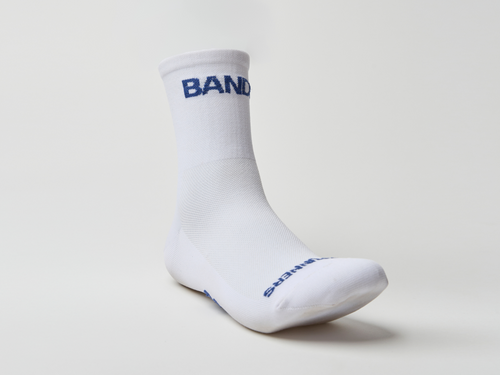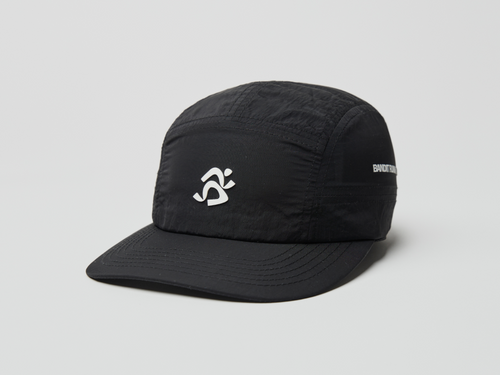An ultrarun through sacred land inspired a collective of Mexican runners to reevaluate their connection with the sport and experiment with running as a cultural and spiritual journey. Born was Aire Libre, immersive retreats that offer a different expression of what running can be while discovering the world.
---
Mauricio Díaz didn’t bother to strap a watch around his wrist when he set out at 5:30 a.m. in the small coastal town of El Desemboque one Sunday in December 2015 to run across the Sonoran desert.
The goal was to get to Kino Bay, on the Sea of Cortez, regarded as one of the most beautiful beaches in Mexico. Díaz, a Lululemon ambassador who describes himself as an adventure runner, was drawn to the state of Sonora in the Gulf of California alongside a few friends for this uniquely intimate and nonconformist running experience that would bring them a greater appreciation for the natural landscape. And in the process, they’d learn more about the small indigenous community of the Seri.
This, by no means, was a race. This, by all means, was to deepen their relationship with running rather than being distracted by minutes on a clock.

“We didn’t have any pressure,” Díaz remembers. Therefore, no expectations. The run was an adventure through intense heat on a wide dirt trail that sliced through dry vegetation for 56 miles parallel to the Sea of Cortez. And it was all in the company of good friends — Manuel Morato of Mexico and New Yorkers Knox Robinson, Fred Goris and Sean Henry Lee.
If they wanted to run fast, they did. If they wanted to stop and drink beers along the way, they could (and they would). If they wanted to jump into the sea, they allowed themselves that freedom. The purpose of the run was to embrace the entire journey, the lows as much as the highs, and approach running through a lens less familiar in Western culture.
Running, Díaz insists, is not about ego — it’s not all about achieving a personal record or collecting medals or a number on a clock. Running can be appreciated in other layers outside of all of that. It can serve as a spiritual tool for transformation, a rite of passage of sorts. That’s how the Seri considered Díaz’s pilgrimage across their territory when he and Morato requested permission to enter their land with a few other devout runners.
“Their home is not a home a Westerner would think of as a home in that it has four walls and a roof. Their home is their land, nature,” Díaz explains. In other words, sacred territory. The Seri consider their identity to be interconnected with their environment.

To pass through it without permission was considered deeply disrespectful, not to mention dangerous. The area Díaz and Co wanted to run though is completely desolated, nothing more than a handful of members of the tribe and four wheelers toting drugs up north, Díaz described.
If they wanted to trek 90 kilometers through the territory, they not only needed the blessing from the Seri, they needed their protection. And the Seri, as Díaz was told, had considered the journey to be a mind-body sacrifice. Therefore, it was going to bring good to the land and to the people.
Yes, they were informed, “You have the keys to our land.”
***
Diaz, a runner since 2010, got into the sport while studying abroad in Europe in college. He quickly connected running with exploring the world and began racing all over the continent. A marathon in Barcelona, followed by races in Germany, France and beyond allowed him to understand how running was a way to get to know places more deeply, Díaz says. After he was hooked into the world of distance running, Díaz segued into trail running post college, when he realized that another side existed outside of mass participation races.
This other world of running is what Díaz has continued to chase — unconventional, arrestingly beautiful terrains absent of metrics and necessitates having an open mind. Be willing to learn, be willing to grow is an approach to running that Díaz wants others to better understand.
“The world is an amazing playground and full of surprises,” says Díaz, as he would better comprehend while running through the Sonoran desert. He described the 13-hour experience as profound, so much so that it inspired him to found Aire Libre with friends Manuel Morato and Daniel Almazán Klinckwort. They wanted to offer others a way to experience a wholeness and oneness similar to what was felt during the desert run (though, of course, not quite as hard core). The company’s name translates from Spanish to “free air”.

“Our way of looking at running is that it is not the end, but it’s the means to connect, it’s the means to learn,” Díaz says.
Since creating Aire Libre in January 2016, the Mexico-City based company has organized week-long running experiences as well as weekend getaways throughout Mexico, South America and the U.S., emphasizing a combination of indigenous immersion with a wellness component in remote locations.
In the past, that included Copper Canyon in northern Mexico, where runners had the rare opportunity to run with the Tarahumara, a tribe native to Chihuahua and known for having a remarkable long-distance running ability. Runners were also guided through cleansing rituals by local medicine men.
In the state of Oaxaca, a retreat during the Day of the Dead holiday brought runners to the mountains of the Sierra Norte, where they connected with a group of Zapotec communities and ran on ancient trails. A Lake District retreat in Patagonia offered a taste of Chilean culture while exploring coastal cliffs of the northern tip of the country. And during a weekend in Sedona, Arizona, famous for its energy vortexes, runners explored trails through red rock country.
The experiences, designed for runners of all abilities, often integrate yoga and meditation as well as engaging in traditional ceremonies of whichever country the retreat takes place in. Díaz says a big part of the offering is sharing sacred rituals that can benefit a runner, such as being in a temazcal, a ceremony led by a spiritual leader inside a traditional sweat lodge, where one sits for up to two hours. The ceremony represents a rebirth in the womb of mother earth. “Medicine for the soul,” Díaz says.
That’s what running is, too. Díaz adds, “A way of celebrating life.”














